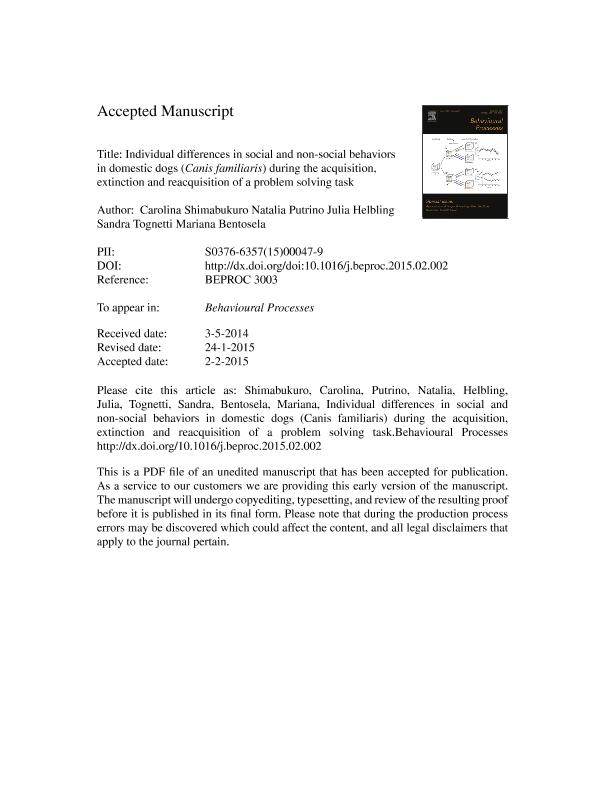Mostrar el registro sencillo del ítem
dc.contributor.author
Shimabukuro, Carolina
dc.contributor.author
Putrino, Natalia Inés

dc.contributor.author
Helbling, Maria Julia

dc.contributor.author
Tognetti, Sandra
dc.contributor.author
Bentosela, Mariana

dc.date.available
2022-12-28T10:50:11Z
dc.date.issued
2015-04
dc.identifier.citation
Shimabukuro, Carolina; Putrino, Natalia Inés; Helbling, Maria Julia; Tognetti, Sandra; Bentosela, Mariana; Individual differences in social and non-social behaviors in domestic dogs (Canis familiaris) during the acquisition, extinction and reacquisition of a problem solving task; Elsevier Science; Behavioural Processes; 113; 4-2015; 179-186
dc.identifier.issn
0376-6357
dc.identifier.uri
http://hdl.handle.net/11336/182623
dc.description.abstract
Dogs are able to solve different problems by trial and error learning, but it seems that they cannot understand the means-end connection. Some studies suggest that dogs' performance is influenced by their breed and by the level of familiarity with the person they interact with. In our study, we assess individual differences in both social and non-social responses in a problem-solving task during the acquisition, extinction, and reacquisition phases. In order to investigate the effect of familiarity, in the first experiment, the human present during the task was either a familiar (the dog's owner) or unfamiliar person. In the second experiment, we compared breeds (Retrievers and Shepherds) that had previously shown differences in a communicative task. The results revealed that all groups learned the task and became more efficient in the acquisition trials. These non-social responses diminished during extinction, where an increase in social responses was observed. With regard to individual differences, dogs were more persistent in searching the reward during the second extinction trial when the owner was present (in contrast with a stranger), and also looked longer at the unfamiliar person at the beginning of the acquisition trial. On the other hand, Retrievers showed greater social motivation during reacquisition and Shepherds picked up more bones during the third acquisition trial, thus suggesting a more persistent search of the reward. These findings highlight the relevance of studying different learning schedules as well as individual differences in problem-solving ability so as to improve selection and training techniques.
dc.format
application/pdf
dc.language.iso
eng
dc.publisher
Elsevier Science

dc.rights
info:eu-repo/semantics/openAccess
dc.rights.uri
https://creativecommons.org/licenses/by-nc-nd/2.5/ar/
dc.subject
BREEDS
dc.subject
LEARNING
dc.subject
OWNER-STRANGER
dc.subject
PROBLEM SOLVING
dc.subject
SOCIAL RESPONSES
dc.subject.classification
Otras Psicología

dc.subject.classification
Psicología

dc.subject.classification
CIENCIAS SOCIALES

dc.title
Individual differences in social and non-social behaviors in domestic dogs (Canis familiaris) during the acquisition, extinction and reacquisition of a problem solving task
dc.type
info:eu-repo/semantics/article
dc.type
info:ar-repo/semantics/artículo
dc.type
info:eu-repo/semantics/publishedVersion
dc.date.updated
2022-12-27T18:06:52Z
dc.identifier.eissn
1872-8308
dc.journal.volume
113
dc.journal.pagination
179-186
dc.journal.pais
Países Bajos

dc.journal.ciudad
Amsterdam
dc.description.fil
Fil: Shimabukuro, Carolina. Consejo Nacional de Investigaciones Científicas y Técnicas. Oficina de Coordinación Administrativa Houssay. Instituto de Investigaciones Médicas. Universidad de Buenos Aires. Facultad de Medicina. Instituto de Investigaciones Médicas; Argentina
dc.description.fil
Fil: Putrino, Natalia Inés. Consejo Nacional de Investigaciones Científicas y Técnicas. Oficina de Coordinación Administrativa Houssay. Instituto de Investigaciones Médicas. Universidad de Buenos Aires. Facultad de Medicina. Instituto de Investigaciones Médicas; Argentina
dc.description.fil
Fil: Helbling, Maria Julia. Consejo Nacional de Investigaciones Científicas y Técnicas. Oficina de Coordinación Administrativa Houssay. Instituto de Investigaciones Médicas. Universidad de Buenos Aires. Facultad de Medicina. Instituto de Investigaciones Médicas; Argentina
dc.description.fil
Fil: Tognetti, Sandra. Consejo Nacional de Investigaciones Científicas y Técnicas. Oficina de Coordinación Administrativa Houssay. Instituto de Investigaciones Médicas. Universidad de Buenos Aires. Facultad de Medicina. Instituto de Investigaciones Médicas; Argentina
dc.description.fil
Fil: Bentosela, Mariana. Consejo Nacional de Investigaciones Científicas y Técnicas. Oficina de Coordinación Administrativa Houssay. Instituto de Investigaciones Médicas. Universidad de Buenos Aires. Facultad de Medicina. Instituto de Investigaciones Médicas; Argentina
dc.journal.title
Behavioural Processes

dc.relation.alternativeid
info:eu-repo/semantics/altIdentifier/doi/http://dx.doi.org/doi:10.1016/j.beproc.2015.02.002
dc.relation.alternativeid
info:eu-repo/semantics/altIdentifier/url/https://www.sciencedirect.com/science/article/pii/S0376635715000479
Archivos asociados
